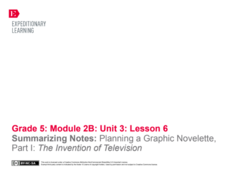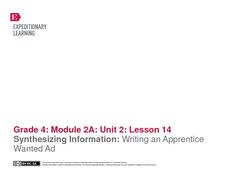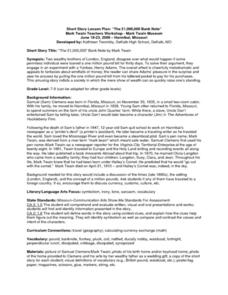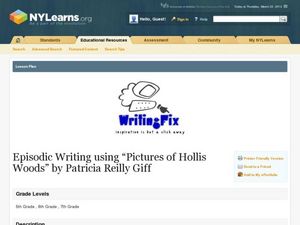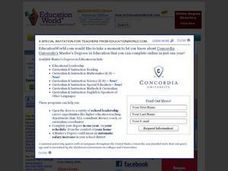Achieve3000
Listening for Main Idea and Supporting Details
Did you hear that? It's the main idea! Teach your class listening and note-taking strategies for determining the main idea by following the steps provided in this plan.
Bright Hub Education
Using Evidence and Supporting Details in Writing
In expository writing, it is important to back up claims with evidence and details. Help your class to develop their writing with notes on different types of evidence. Once they have the basics down, practice with a sample thesis and...
Curated OER
Build Masters: Identifying Details
Find key details in books using this note card strategy. Each reader gets six cards with the classic who, what, where, when, why, and how detail prompts. After they read the book, they choose a card and locate a key detail answering the...
EngageNY
Summarizing Notes: Planning a Graphic Novelette Part 1: The Invention of Television
What's the story? Learners create the first of four storyboards about the invention of the television, incorporating narrative techniques and descriptive details. Next, they offer and receive feedback by participating in a peer critique...
Curated OER
Reading Examples
Young writers read excerpts from Gary Paulsen's memoir to identify figurative and literal language that contain sensory details. They determine which selections are examples of sensory language and fi the language is used literally or...
EngageNY
Reading for Details: Taking an Inventory in the Rainforest (Pages 28–31)
Take inventory. Scholars analyze pages 28-31 of The Most Beautiful Roof in the World and use a note catcher to model how Meg Lowman took inventory of the species in the rainforest. Learners then take a close look at the vocabulary in the...
Curated OER
Using Details From The Text
Begin this expository writing activity by reading a non-fiction book of your choice and modeling expository writing. The plan suggests The Trip of a Drip by Vicki Cobb but notes that other texts will work. Learners then choose a...
Curated OER
A Seashell Lesson: Writing for Detail and the Scientific Process
Practice descriptive language in this lesson plan, which prompts elementary and middle schoolers to write detailed descriptive sentences describing a seashell. They write a description of a shell, create an illustration, and other...
West Contra Costa Unified School District
Introduction to Conditional Probability
Here is a turnkey lesson that walks young statisticians through the development and uses of conditional probability. From dice games to surveys, Venn diagrams to frequency tables, the class learns how a given can effect the overall...
EngageNY
Synthesizing Information: Writing an Apprentice Wanted Ad
Fourth graders view examples of help-wanted ads as they plan and create their own writing in the fourteenth instructional activity of this unit on colonial trade. The engagement of the class is captured when the teacher shares an actual...
Weebly
Author Study: Eric Carle
Dive into an author study of one of the most beloved children’s book authors, Eric Carle. After reading some of his stories, including Papa Get me the Moon, A House for Hermit Crab, The Grouchy Ladybug, and The Very Busy Spider, readers...
EngageNY
Writing to Show, Not Tell: Dialogue, Sensory Words, and Strong Action Verbs
Consume, gobble, devour ... serving up strong verbs! Writers focus on using dialogue, strong action verbs, and sensory details in their writing. After analyzing a model narrative, they apply their learning to their own hero's journey...
Curated OER
"The 1,000,000 Pound Bank Note" by Mark Twain
Compare real events from Mark Twain's life to events in the story. Middle school readers identify point-of-view, its purpose, and its reliability by citing two examples. They describe the tone of the story using four examples and...
Curated OER
Let's Get it Together! Reading to Learn
Let’s learn about frogs! Young readers are led through “Freaky Frogs,” a non-fiction article. Teach learners how to edit an article so there are fewer details to sift through. After talking through the article, they learn the six steps...
Curated OER
Episodic Writing Using Pictures of Hollis Woods by Patricia Reilly Giff
Help your middle-schoolers expand their writing skills with this lesson on episodic writing, which focuses on story details, idea development, and organization. After reading "The Eighth Picture: End of Summer" from Patricia Reilly...
EngageNY
End of Unit 1 Assessment: Inferring and Synthesizing (From Two Texts) About Life in Colonial America
Close your colonial America unit with a performance-based assessment. Class members will show their proficiency in several skills including using details to back up inferences, determining the meaning of words in context,...
EngageNY
The Power of Exponential Growth
How do you make a penny grow to $5,000 in just 15 days? Use the examples in this lesson to explore the concept of exponential growth and its comparison to linear models. Pupils come to understand that exponential growth eventually...
Curated OER
Note Taking By Crayon
Skim a brief biography of Amelia Earhart with your class, and then assign groups of researchers one of four topics listed: Amelia's family life, important airplane flights during Amelia's life, turning points in Amelia's life, and...
Scholastic
Outlining Main Ideas and Details
Practice outlining and evaluating expository writing in this lesson. After discussing main ideas and seeing examples, young writers go through a sample outline and discuss the way to properly format a piece of writing. They then create...
Curated OER
Narrative Nuts and Bolts
After viewing slides and reading about child labor, young authors compose an original narrative story. They practice note-taking skills and work to effectively engage a reader by incorporating plot, logical order, complex characters,...
Curated OER
Listening To a Guest Speaker
Pupils review the main points of note-taking to summarize the content of a formal or informal spoken presentation. They hear a guest speaker talk about a pre-arranged topic and take notes during the presentation. Next, they write a...
Curated OER
Lesson Plan 12: Writing With All Your Senses
What does an ice cream sundae sound like? Challenge young writers to move beyond visual descriptions and craft details that appeal to all five senses. The examples provided by the script in this resource show pupils how to create rich...
Curated OER
Hands-On Outlining
In order to write an effective outline, children must be able to identify main ideas and supporting details, which is the aim of this fun and kinesthetic activity. The class works on the floor to organize sentence strips prepared by the...
EngageNY
Solving Basic One-Variable Quadratic Equations
Help pupils to determine whether using square roots is the method of choice when solving quadratic equations by presenting a lesson that begins with a dropped object example and asks for a solution. This introduction to solving by square...





